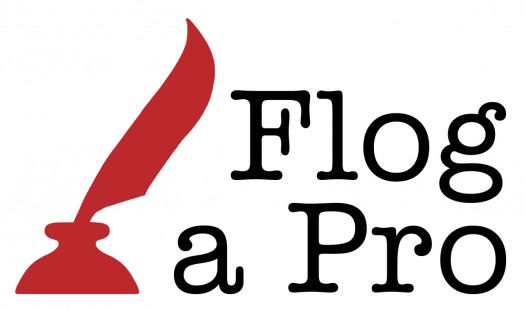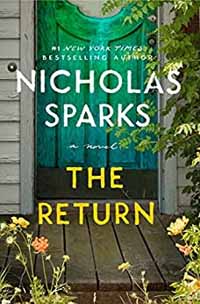Flog a Pro: Would You Pay to Turn the First Page of this Bestseller?
By Ray Rhamey | October 15, 2020 |

Trained by reading hundreds of submissions, editors and agents often make their read/not-read decision on the first page. In a customarily formatted book manuscript with chapters starting about 1/3 of the way down the page (double-spaced, 1-inch margins, 12-point type), there are 16 or 17 lines on the first page.
Here’s the question:
Would you pay good money to read the rest of the chapter? With 50 chapters in a book that costs $15, each chapter would be “worth” 30 cents.
So, before you read the excerpt, take 30 cents from your pocket or purse. When you’re done, decide what to do with those three dimes or the quarter and a nickel. It’s not much, but think of paying 30 cents for the rest of the chapter every time you sample a book’s first page. In a sense, time is money for a literary agent working her way through a raft of submissions, and she is spending that resource whenever she turns a page.
Please judge by storytelling quality, not by genre or content—some reject an opening page immediately because of genre, but that’s not a good enough reason when the point is to analyze for storytelling strength.
This novel was number one on the New York Times hardcover fiction bestseller list for October 18, 2020. How strong is the opening page—would it, all on its own, hook an agent if it came in from an unpublished writer?
Following are what would be the first 17 manuscript lines of the prologue.
The church resembles an alpine chapel, the kind you might find in the mountains outside Salzburg, and inside the cool air is welcoming. Because it’s August in the South, the temperature is sweltering, made worse by the suit and tie I’m wearing. In my daily life, I generally don’t wear suits. They’re uncomfortable and as a physician, I’ve learned that my patients respond better to me when I’m dressed more casually, as they tend to be.
I’m here to attend a wedding. I’ve known the bride for more than five years now, though I’m not sure that she would consider us friends. Though we’d spoken regularly for more than a year after she left New Bern, our relationship since then has been limited to a couple of texts every now and then, sometimes instigated by her, sometimes by me. We do, however, have an undeniable bond, one that has its roots in events that occurred years ago. Sometimes it’s hard for me to remember the man I was when our paths first crossed, but isn’t that normal? Life endlessly offers us chances to set new directions and in the process we grow and change; when we look in the rearview mirror, we catch a glimpse of former selves who sometimes seem unrecognizable.
Some things haven’t changed—my name, for instance—but I’m thirty-seven now and in the early stages of a new career, one I’d never considered in the first three decades of my life. While I’d once loved the piano, I no longer play the instrument; where I’d grown up with a loving family, it’s been a long time since I’ve seen any of them. There are reasons for that, but (snip)
You can turn the page and read more here. Were the opening pages of the prologue of The Return by Nicholas Sparks compelling?
My vote: No.
 This book received 4.6 out of 5 stars on Amazon. A constant topic amongst writers and agents and editors is tension. Tension on every page. Micro-tension. My take on tension in fiction is that there are two facets of tension that are important to narrative success: story tension and reader tension.
This book received 4.6 out of 5 stars on Amazon. A constant topic amongst writers and agents and editors is tension. Tension on every page. Micro-tension. My take on tension in fiction is that there are two facets of tension that are important to narrative success: story tension and reader tension.
Story tension is the on-the-page stuff, the events that are happening in the story. That kind of tension is supposed to evoke the other kind, reader tension. Reader tension is that urge/itch/need to keep reading. A good measure of reader tension is story questions. If the narrative’s tension fires up a strong what-happens-next story question in a reader, the story is on its way to being read.
On my blog, Flogging the Quill, I often post a first-page checklist of things a writer should consider doing—and not doing—on their first page and on subsequent pages. The third item in the list is this:
- The character takes action. Can be internal or external action: thoughts, deeds, emotions. This does NOT include musing about whatever.
Strike one for this opening. What’s compelling about this person musing about his age, his name, his piano, his . . . But, the way I see it, that’s not the only strike against this page. We’ll return to my checklist (You can download a PDF of the complete list here.) for strikes two, three, four, and five.
- It happens in the NOW of the story.
- Backstory? What backstory? We’re in the NOW of the story.
- Set-up? What set-up? We’re in the NOW of the story.
- The one thing it must do: raise a story question.
For me, this opening page fails to engage me at any level, and I do not come to the end of it with a story question worth considering. Your thoughts?
You’re invited to a flogging—your own You see here the insights fresh eyes bring to the performance of bestseller first pages, so why not do the same with the opening of your WIP? Submit your prologue/first chapter to my blog, Flogging the Quill, and I’ll give you my thoughts and even a little line editing if I see a need. And the readers of FtQ are good at offering constructive notes, too. Hope to see you there.
To submit, email your first chapter or prologue (or both) as an attachment to me, and let me know if it’s okay to use your first page and to post the complete chapter.
[coffee]










“Can’t wait” was a stretch, but I voted yes anyway, after musing and pondering almost as much as the narrator does. Maybe I just want a more leisurely read to escape from the frenzied weirdness of the political scene. I was drawn in (slowly, I admit) by the little hints of past troubles affecting the present. After looking at the book itself, I think the first chapter would have made a better beginning; scene and characters and action are much more vivid than in this prologue.
I agree with Anna that “can’t wait” is a stretch – and I’m not a big fan of this writer – but I’m a sucker for stories about broken relationships. So I voted yes.
I really enjoyed this, even though I’m not a big fan of NS. But he pulled me in because I want to know what happened. It sounds like a redemption story and I’m sucker for those.
Maybe it’s because I didn’t sleep well last night and haven’t had enough coffee yet, but this opener made me grouchy. It felt ponderous and it reminded me of this guy in Alabama who loved to hear himself talk. He’d start telling you a tale in his laconic voice, then stop and say, “Well, to make a long story a little longer…” So, no.
I am more tolerant of meandering and rumination in prologues, which I’m guessing this is, than in true openings, and as Anna says, there’s value to a leisurely read, especially in a story focused on relationships. But sadly, this didn’t engage me on any level. I have to guess that it’s a love-gone-wrong story, and that our narrator may redeem himself, but from this page alone, it’s hard to think the payoff will be worth the read.
I voted no. For obvious reasons, I’m intrigued by what would make a physician leave a profession he worked his a** off to obtain, and there are many hints being dropped about a restless man in transition after enduring Big Events. But the setup went on too long for it to sustain any kind of tension.
Does NS typically write in first-person present tense? For some reason I thought he usually did third past. (Just noting this as a technical/commercial choice that might be new.)
Also, I don’t know why, but this voice read very female to me. In fact, the suit reference jolted me.
Even as a prologue it felt like an info dump to me. Boring…
I really wish there were a third option, something like, “I’m curious, but not enough to pay full price,” or “I’d have to be in the right mood.” Either one of those would be closer to my feelings than the two options given.
As it is, I chose no because the story question that’s raised (“If the narrator and the bride are currently so distant, why is the narrator at her wedding at all?”) doesn’t interest me enough to pay $30 for it.
I don’t mind a lengthy set-up, as long as it engages my attention and makes me care about the protagonist. This read like someone rambling on and on, nervously making small talk with a stranger. Sparks has written better stuff.
I disagree that no story questions are raised, but they are too vague to create much tension and the voice is very flat.
I vote no. In a first person viewpoint, I expect the voice of the character to be engaging, witty, interesting, or at least different enough to make me want to know him or her better. This character sounds like a rambling old man who doesn’t intrigue me enough to read on.
No. – The idea of a chapel near Salzburg struck a chord, probably because I am Austrian, but it was not enough. When the narrator started musing about his clothes choices, I was already at the point of “why should I care what you are wearing?”. I am generally a very patient reader and I can enjoy a slow beginning, I found nothing at all here that kept my attention.